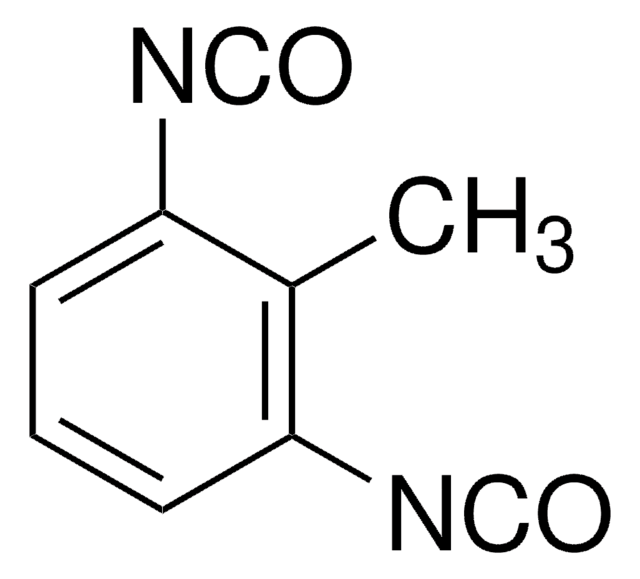256439
4,4′-Methylenebis(phenyl isocyanate)
98%
Synonyme(s) :
4,4′-MDI, Bis(4-isocyanatophenyl)methane
About This Item
Produits recommandés
Niveau de qualité
Pureté
98%
Forme
solid
Pertinence de la réaction
reagent type: cross-linking reagent
Point d'ébullition
200 °C/5 mmHg (lit.)
Pf
42-45 °C (lit.)
Densité
1.18 g/mL at 25 °C (lit.)
Température de stockage
−20°C
Chaîne SMILES
O=C=Nc1ccc(Cc2ccc(cc2)N=C=O)cc1
InChI
1S/C15H10N2O2/c18-10-16-14-5-1-12(2-6-14)9-13-3-7-15(8-4-13)17-11-19/h1-8H,9H2
Clé InChI
UPMLOUAZCHDJJD-UHFFFAOYSA-N
Vous recherchez des produits similaires ? Visite Guide de comparaison des produits
Description générale
Application
- Polyurethane cationomers, that are applicable in medical implants.
- A prepolymer for preparing self-healable polyurethane elastomers.
Mention d'avertissement
Danger
Mentions de danger
Conseils de prudence
Classification des risques
Acute Tox. 4 Inhalation - Carc. 2 - Eye Irrit. 2 - Resp. Sens. 1 - Skin Irrit. 2 - Skin Sens. 1 - STOT RE 2 Inhalation - STOT SE 3
Organes cibles
Respiratory system
Code de la classe de stockage
11 - Combustible Solids
Classe de danger pour l'eau (WGK)
WGK 1
Point d'éclair (°F)
411.8 °F - closed cup
Point d'éclair (°C)
211 °C - closed cup
Équipement de protection individuelle
dust mask type N95 (US), Eyeshields, Faceshields, Gloves
Certificats d'analyse (COA)
Recherchez un Certificats d'analyse (COA) en saisissant le numéro de lot du produit. Les numéros de lot figurent sur l'étiquette du produit après les mots "Lot" ou "Batch".
Déjà en possession de ce produit ?
Retrouvez la documentation relative aux produits que vous avez récemment achetés dans la Bibliothèque de documents.
Les clients ont également consulté
Notre équipe de scientifiques dispose d'une expérience dans tous les secteurs de la recherche, notamment en sciences de la vie, science des matériaux, synthèse chimique, chromatographie, analyse et dans de nombreux autres domaines..
Contacter notre Service technique











